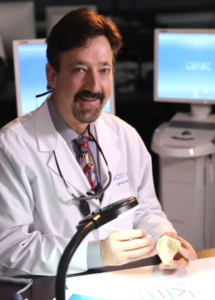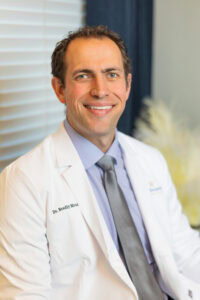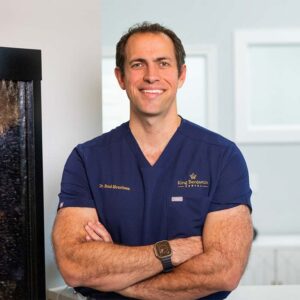People often mistake dental services for commodities. As I have provided dental care in Naples, FL – I frequently run into this issue. Patients assume a dental filling is the same no matter where it’s done, or that a dental crown from one office is identical to one from another. It’s a mindset shaped by fast food and big-box retailers, where standardization is everything and “same item, different store” makes sense.
But the best dentistry isn’t fast food.
If we’re being honest, dentistry is far more like theater than McDonald’s.
A Personal Realization: Dentistry Isn’t One-Size-Fits-All
I first noticed this widespread misconception back when I began practicing with my father in South Jordan, Utah at Mouritsen Dental (now Park Family and Cosmetic Dentistry). This was my first exposure to real, day-in-day-out dentistry—not the kind you see in textbooks or lectures – and definitely a change of pace from dental school at Roseman University. From day one, the contrast between what we provided and what patients expected was striking.

Roseman University – South Jordan, UT
My dad and I practiced with a clear commitment to excellence. Our techniques, standards, and patient care were not generic. They were uniquely ours—crafted through training, experience, and intention. Yet, again and again, patients would reduce all of that to a number.
They’d say things like;
“I got a quote from another office—can you match it?”
as if what we did was exactly the same. But honestly, that is so far from the truth.
It was disheartening. I had poured my heart into this profession. I studied, practiced, refined, obsessed—yet I was being treated as interchangeable with “Dr. Joe” down the street, someone the patient barely knew.
But the truth is, I’m not Dr. Joe. And he’s not me.
Theatrical Dentistry: Why Talent and Technique Matter

Dr Klim Dr. Klim is an internationally recognized speaker, author, manufacture consultant, beta tester, and teacher of biofunctional and aesthetic CAD/CAM dentistry
Before we go too far – Theatrical Dentistry as I am using it, is not as the traditional “change an actors appearance” as most may see. I steal the idea from thought leader and clinical expert Dr. James Klim DDS, FAGD, AACD – Dr Klim is an amazing clinician and his passion for excellence is unparalleled, and to the point – uniquely his.
To illustrate the difference, let’s go back to that theater metaphor. Imagine your eight-year-old is cast in a school play of Les Misérables. You’re proud, and it’s sweet. But let’s be honest—it’s nothing like watching Les Misérables on Broadway. Same story, yes. Same title, yep. But the experience? Not even close.
Now apply that same logic to a dental crown. Sure, it’s called a “crown” in every office. But the preparation, materials, craftsmanship, and philosophy behind how that crown is made and delivered? Entirely different.
Just like no two actors are the same—Tom Cruise and Will Ferrell can both be in films, but they bring wildly different energy and skillsets—no two dentists are the same. I, Dr. Bradly Mouritsen, bring a different level of attention to detail, communication, training, and care than any other practitioner. That’s not arrogance. It’s reality.
Why the Public Sees Dentistry as a Commodity
Honestly, I can’t blame patients for thinking this way. Our profession hasn’t exactly made it easy to understand the difference between high-quality care and the bare minimum.
Dentistry is filled with technical complexity. Most people don’t have the time—or desire—to think about things like reduction techniques, isolation protocols, bonding agents, occlusion adjustments, or material science. Dentists don’t even agree amongst themselves half the time. So how can we expect the public to?
And when you strip away the nuances and bury everything under a layer of insurance codes, what do patients have left to compare? Price. Coverage. Convenience.
It’s no wonder dental care feels like a commodity.
When Insurance Dictates Treatment, Everyone Loses
To make matters worse, many offices let insurance companies dictate the kind of care they provide. Multi-billion-dollar corporations with shareholders and profit targets often decide whether a treatment gets approved, delayed, or denied—based on algorithms, not your health. (Delta Dental alone had a profit margin of 230.9M in 2024 alone)
When that happens, patient care suffers. Dentists may resort to using cheaper materials, taking shortcuts, or offering treatment options that fit within a policy instead of what’s actually best for your long-term oral health.
My Approach: Personalized Dentistry with Purpose
That’s not how we do things here.
When you call my office as a new patient, I’m not just gathering your information for billing. I want to know your name, your story, and how you found us. Not because it’s required by software, but because you matter.
Before I ever look in your mouth, I want to understand your goals. Do you want to maintain your natural teeth for life? Are you okay with dentures down the road? What do you want out of your smile and your health?
Once I understand your vision, we craft a treatment plan—just for you. Not for an insurance company. Not based on shortcuts. Just you, your goals, and your future.
Then, the actual treatment begins—with materials and methods I’ve tested and trusted over years of clinical experience. I don’t just default to what’s fastest or cheapest. I use what preserves your health, function, and comfort for the long haul.
For Example: Rethinking the Dental Crown
Let’s talk about crowns.
Most offices use what I call the “grind it down and cap it” method. It’s aggressive, removes more tooth than necessary, and often leads to future problems like root canals or fractured teeth. I have it Why do they do it? It’s easier. It’s what insurance expects. It fits the system. Sadly, but truthfully, I have heard of this technique called “the circle of death” – because so much tooth has been removed that if anything goes wrong – its game over for that tooth.
But that’s not what I do.
My crown preparations are conservative. I remove only what’s necessary—broken, decayed, or compromised—and leave as much of your natural tooth as possible. It’s less traumatic. It’s more precise. Its even same day! And it leads to better, longer-lasting results.
Short-Term Thinking Leads to Long-Term Problems
When people focus solely on cost or coverage, they often make short-term decisions with long-term consequences. It’s like telling your mechanic:
“Just check the tires and give it a wash.”
Sure, it’ll look fine today—but what about the oil leak, the worn brake pads, or the engine knock? Ignored now, they’ll cost you ten times more later.
The mouth is no different. A small issue now, left unchecked, becomes a major problem down the road—one that costs more, hurts more, and requires more time to fix.
Passion Is the X-Factor
Here’s the real differentiator: passion.
You can tell when a dentist is just going through the motions—punching the clock, staying in network, and collecting a paycheck. But you can also spot the ones who are lit up by their work. They’re constantly studying, taking photos, attending advanced courses, and striving to master their craft.
At my office, we’re obsessed with excellence. Not perfection—but purpose. We want your care to feel thoughtful, customized, and elevated.
So How Do You Know the Difference?
This is the hardest part—communicating the invisible differences. It’s difficult to explain bonding techniques or margin design in a way that matters to someone just looking for affordable care.
But maybe we’re focusing on the wrong thing.
The fitness industry figured this out a long time ago. They don’t lead with “here’s the science of hypertrophy.” They say,
“How do you want to look in your wedding dress?”
“Do you want to hike with your kids pain-free?”
They sell the outcome, not the process.
Dentistry could learn from that.
Let’s Talk About What Really Matters
When I sit down with patients and ask, “What do you want for your teeth long-term?” many are caught off guard. But then, something clicks. They say:
“I want to be able to eat steak.”
“I want to smile without hiding my teeth.”
“I want to avoid dentures like my dad had.”
And now we’re talking about outcomes. Now we’re building something together.
The Bottom Line
Dental care isn’t a commodity. It’s not just a crown. Not just a filling. Not just another appointment.
It’s a relationship. An investment. A performance where the quality of the actor (or dentist) changes everything about the experience and results.
So next time you’re looking for dental work, ask different questions – especially of yourself.
Ask:
-
What is important to me?
-
How does this decision effect my long term goals?
-
What’s my philosophy on long-term care?
-
What outcomes do I envision for myself?
Because your smile – and your health – deserves better than fast food.
It deserves Broadway.
— Dr. Bradly Mouritsen DMD
King Benjamin Dental
Naples, FL

Dr. Bradly Mouritsen, founder of King Benjamin Dental in Naples, FL — delivering personalized, patient-first care rooted in excellence, precision, and passion.
Ready to book an appointment? We would love to meet you! Please call us or stop on by.
We would be honored to be entrusted with your oral healthcare.



